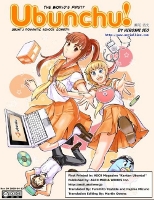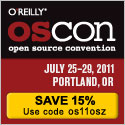
Ubunchu - A Ubuntu Manga Comic Book (Credit: Ubunchu)
Earlier this month, Ubunchu, a comic book for Ubuntu, was published in Japanese. Ubunchu is about three students in a sysadmin club who are learning about Ubuntu. Japanese Manga artist (Mangaka) Hiroshi Seo is the creator of this comic series and his first edition has already been translated into English, French, Indonesian, Korean, Portuguese, Russian, Spanish, Vietnamese. Translated versions can be found here.
The comic book format has become an interesting, if novel, way to popularize technology. For example, when Google released Chrome, it introduced its new browser accompanied by a wildly popular comic book. I believe this format could also help kids in middle school and high school learn about the latest technologies like Linux and open source.
Calling on our Indian language localizers… Are you ready to translate Ubunchu? Ubunchu comes with a Creative Commons license and has the SVG source available too. So it should be easy to translate and spread the word.
And here is what Hiroshi says to translators…
For translators:
- If your are planning to translate the manga into another language, my consent is not required, for it is released under Creative Commons BY-NC license. Though I’d really appreciate if you let me know it when it’s done. Then I would add the link of the distribution site to the list above.
- Both English version’s are distributed with it’s SVG sources. You will find it very easy to edit with SVG editing software like Inkscape. Thanks to DoctorMO & C-quel’s work! When using these sources, please don’t forget to add the credit for them.


